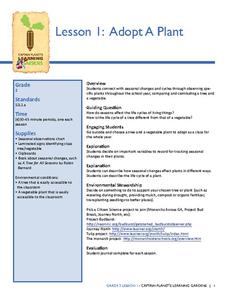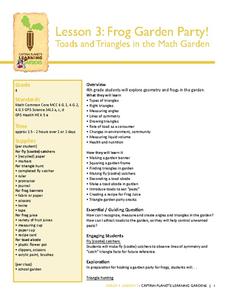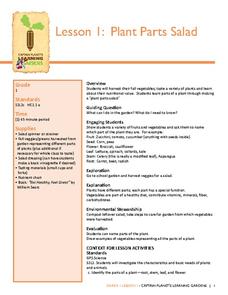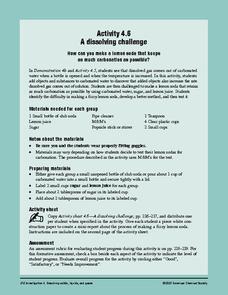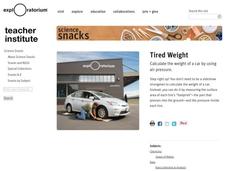Captain Planet Foundation
Help a Sister Out: Garden Companions
Explore Native American gardening traditions with a lesson on companion planting. Based on the concept that certain crops grow better when planted near other specific crops, kids research the gardening method with background links and by...
Captain Planet Foundation
Sorting Out Soils
Sift through soil and learn about why it's important for organic processes. After discussing what makes up soil, such as the living organisms and what types of soil have more nutrients, kids sample layers of mulch and deeper soil to...
Captain Planet Foundation
Adopt-A-Plant
Note the way that plants change during the season by adopting a plant on your school campus. After your class chooses their plant, they research the plant's needs, how it differs from other plants, find ways to support their plant's...
Captain Planet Foundation
Square Foot Fall Garden
First graders learn the basic needs of plants and identify geometric shapes while planting a fall garden. Combining math and science in one lesson, the resource guides kids through starting their class garden as they discover the...
Captain Planet Foundation
P is for Poppies
Explore the way local farming and rationing helped the war effort in World War I with a lesson plan on gardening. After learning about trench warfare, reading "In Flanders' Field" by John McCrae, and studying poppies, kids discuss the...
Captain Planet Foundation
Frog Garden Party! Toads and Triangles in the Math Garden
It's frog party time! With frog banners, frog juice, and a triangle hunt, your garden party is sure to be both entertaining and educational. The lesson connects geometry, earth science, and delicious snacks to teach kids about ecosystems...
Captain Planet Foundation
Energy Flow in the Garden
How can you tell what an owl has eaten? Study the food chain and flow of energy in an ecosystem by dissecting an owl pellet and noting the bones found inside. Additionally, the lesson includes a game about consumers and producers with a...
Captain Planet Foundation
Worm Your Way Out of This
How can you provide healthy soil for your garden? Study worms, bacteria, and other microorganisms in a lesson about decomposition and organic compost. After discussing what you know about worms and watching a video, watch what worms do...
Captain Planet Foundation
Solar Cooking Race
Study heat transfer with activities that focus on how heat energy works. Using a solar cooker, ice cubes, and heat transfer bracelets, kids experiment and record what they find by keeping ice cubes cold and vegetables hot.
Captain Planet Foundation
Shape Shifters in the Math Garden
Combines mathematical measurement with gardening skills. Third graders hunt for worms in the garden and try to find the longest one. They also measure and weigh vegetables that they harvest from the garden, measure rainfall amounts, and...
We are Teachers
NGSS Explained
Here is a very attractive and well-designed infographic explaining the Next Generation Science Standards (NGSS).
Captain Planet Foundation
Rotting Away
What happens at the end of a plant's life cycle? Show kids the natural way that plants show that they're decomposing, as well as the importance of compost, with a lesson about living organisms. After reading Log Cabin by Anne Schreiber,...
Captain Planet Foundation
George Washington Carver and the Sweet Potato
Learn about George Washington Carver's important contributions to agriculture by studying the sweet potato. First graders read about the inventor's observations and prepare sweet potato slips for the class garden. Additionally, they...
Captain Planet Foundation
Plant Parts Salad
How are vegetables beneficial to a healthy diet? Have kids examine different types of vegetables, such as zucchini, broccoli, and carrots, and determine which parts of the plant they represent. Then, they taste the vegetables as a class....
Captain Planet Foundation
Sense of Place
Explore the five senses with a kindergarten lesson on gardening. After taking a walk through the class garden, kids note what they see, hear, feel, taste, and smell, and then decide what is living in the garden versus what is not living....
Captain Planet Foundation
Fall into Healthy Shapes
Kindergartners identify geometric shapes by planting a fall garden. They start their seeds in containers that have different shapes, and keep track of their plants based on those shapes. This brilliantly designed and incredibly thorough...
NASA
Soda Straw Rockets
Three, two, one, blast off to a better understanding of force and motion with this exciting science instructional activity! Beginning with a discussion about rockets and gravity, young scientists go on to complete a series of worksheets...
TED-Ed
How to Speak Monkey: The Language of Cotton-Top Tamarins
Tamarin monkey language can be categorized by stem upsweep, duration, peak frequency, and frequency change. Although other complex terminology is used to describe the 38 calls of this species, the video is easy to follow and a...
American Chemical Society
A Dissolving Challenge
After collecting carbon dioxide bubbles from a cup of club soda, learners attempt to make their own lemon soda while preventing the loss of carbonation. They do so by creating a syrup before mixing the substances into the club soda....
Wild BC
Climate Change Bingo
Here is a 20-box bingo card to use when exploring ways that humans impact the environment. Various environmentally aware activities are listed in the boxes, and learners circulate the room to find someone who practices the different...
TED-Ed
The Colossal Consequences of Supervolcanoes
The threat posed by super volcanoes is explored in a short video that reviews the destruction caused by Mount Tambora in 1815 and by Peru's Huaynaputina in 1600. Think it can't happen again? The narrator contends that the explosive...
TED-Ed
Tycho Brahe, the Scandalous Astronomer
Who says scientists are boring geeks? Certainly not the narrator of a short video who dishes up the scandals associated with Tycho Brahe, a Danish scientist and alchemist (now that's two labels you don't often see together) who used...
Exploratorium
The Three Little Pig(ments)
Photocopy single-color images onto acetate transparencies and either demonstrate or have your class experience the combination of colors to produce images. Children will learn that cyan, magenta, yellow, and black combine to make all of...
Exploratorium
Tired Weight
Take your class out to visit your automobile and use the tires to compute the weight of the vehicle. This is done by measuring the surface of the tire meeting the ground and the air pressure. This is a fun lesson in the relationship...




